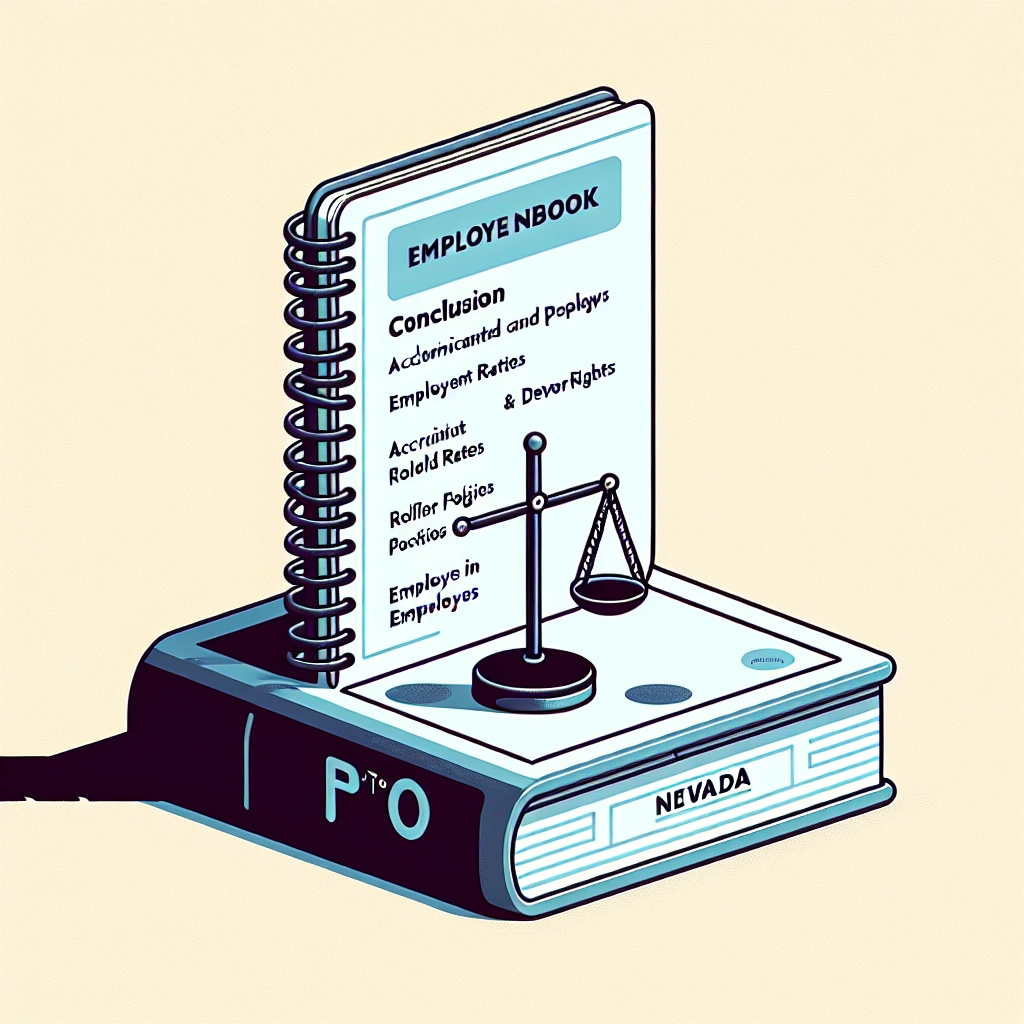Pto Laws Nevada: Your Complete Guide
Short Answer for “pto laws nevada”
Yes, Nevada has PTO laws that mandate employers with 50 or more employees to provide at least 0.01923 hours of paid leave for each hour worked, effective from January 1, 2020.
Paid Time Off (PTO) laws in Nevada mandate that employers with 50 or more employees must provide at least 0.01923 hours of paid leave for each hour worked. This is to ensure that large employers provide paid leave for any reason, similar to the Family Medical Leave Act.
Qualifying Nevada employees are entitled to at least 0.01923 hours of PTO for every hour worked, up to 40 hours per benefit year. This entitlement is provided under SB 312, effective January 1, 2020, with the main purpose of providing paid leave to eligible Nevada employees.
Key Takeaways on PTO Laws in Nevada
-
Nevada employers with 50 or more employees must provide 0.01923 hours of paid leave for each hour worked.
-
Qualifying Nevada employees are entitled to at least 0.01923 hours of PTO for every hour worked, up to 40 hours per benefit year.
-
Employers may require new staff members to wait until their 90th calendar day of employment before utilizing their entitled PTO.
-
Employees in Nevada have legal recourse to sue for unpaid vacation pay if the employer has breached the employment agreement.
-
Nevada state law does not enforce specific requirements regarding paid or unpaid vacation time for employees working at companies with less than 50 employees.

PTO Laws Nevada: Explained
Employee Vacation Rights in Nevada
In Nevada, employees are entitled to paid time off (PTO) based on their hours worked. For example, qualifying employees must receive at least 0.01923 hours of PTO for every hour worked, up to 40 hours per benefit year.
This means that for the typical 40-hour-a-week employee, they would be entitled to 40 hours of paid time off annually. However, it’s important for employees to communicate their intention to take paid leave as soon as possible, and employers may require new staff members to wait until their 90th calendar day of employment before utilizing their entitled PTO.
Definition of Vacation Pay in Nevada
“Vacation pay” in Nevada refers to the paid leave provided to employees, with many companies allowing their employees to accrue this paid time off gradually as they work. The state requires employers with 50 or more employees to provide at least 0.01923 hours of paid leave for every hour worked.
This legislation took effect on January 1, 2020, after Senate Bill (SB) 312 was enacted. In essence, the law aims to ensure that larger employers offer paid leave to their workforce.
Vacation Pay Policies in Nevada
For companies in Nevada with fewer than 50 employees, there is no federal or state law mandating that they provide paid or unpaid vacation time to their staff. However, those organizations with 50 or more employees are subject to the PTO regulations set forth by the state.
One way to ensure compliance and avoid potential legal issues is for employers to keep track of each employee’s PTO entitlement based on their hours worked. This could be carried out through a PTO accrual system, which helps in calculating the exact amount of PTO owed to each employee.
Legal Recourse for PTO Disputes
Can I Sue for Vacation Pay?
In Nevada, employees have legal recourse to sue for vacation pay under certain circumstances. The Nevada law does not mandate employers to provide paid vacation time. However, if the employer has a policy or contract in place promising paid vacation time, it becomes part of the employment agreement and should be honored. Nevada PTO laws stipulate that if an employer fails to fulfill their obligation to provide paid vacation as per the agreement, the employee may have grounds to sue for unpaid vacation pay.
Filing a Claim
When it comes to filing a claim for unpaid vacation pay in Nevada, employees can seek legal recourse through the state’s labor office or file a lawsuit against the employer. The first step would typically involve documenting the agreement or policy regarding vacation pay, along with any evidence of the employer’s failure to honor the agreement.
Employees can file a wage claim with the Nevada Labor Commissioner’s Office, initiating the process to collect unpaid wages and benefits, including vacation pay.
The policies and procedures for wage claim processing in Nevada involve the plaintiff (employee) filing a claim against the defendant (employer) using the necessary forms provided by the Nevada Labor Commissioner’s Office. This sets the legal process in motion for the collection of unpaid wages, including accrued vacation pay. Working with legal counsel experienced in Nevada PTO laws can be beneficial in navigating the complexities of the claim process and ensuring all necessary steps are followed.
Suing the Employer
Employees in Nevada may take legal action against their employer to recover unpaid vacation time through a lawsuit under state law. If an employer has breached the employment agreement by not providing earned paid time off, a lawyer can represent the employee in a lawsuit to seek recovery of the accrued but unpaid vacation pay.
In such cases, the employee’s legal representative can pursue legal action either on an individual basis or on behalf of a group of employees (class action) based on the circumstances and scale of the violation.
To summarize the legal recourse for PTO disputes in Nevada, employees can sue for unpaid vacation pay if the employer has failed to fulfill their commitment as per an agreed policy or contract. Filing a claim with the Nevada Labor Commissioner’s Office provides a formal process to collect unpaid wages, including vacation pay, and taking legal action through a lawsuit under state law presents another avenue to seek recovery of accrued but unpaid vacation time.

Additional Resources for Understanding PTO Laws in Nevada
Paid Time Off (PTO) Laws Overview
In Nevada, employers with 50 or more employees are mandated to provide paid leave for any reason. This legislative initiative sets Nevada apart as the second state in America to enforce this regulation, closely following Maine.
The law requires that qualifying employees receive a minimum of 0.01923 hours of PTO for every hour worked, up to a cap of 40 hours per benefit year. For instance, if an employee works a total of 40 hours per week, they will be eligible for 15.38 hours of paid time off annually.
These measures emerged under Senate Bill (SB) 312, which ushered in this change effective from January 1, 2020.
Nevada Senate Bill (SB) 312 Key Highlights
Senate Bill (SB) 312 signifies a fundamental shift in Nevada’s labor regulations. It applies to private sector employers with 50 or more employees, requiring them to grant paid time off to employees for any reason, not exclusively for sick leave.
The provision mandates that employers allot a minimum of 0.01923 hours of PTO for each hour worked. This introduction of a blanket paid leave allowance differs from the existing landscape, fostering a work culture that prioritizes employee well-being and work-life balance.
Furthermore, the labor commissioner will play a pivotal role in determining the 50-employee threshold under this legislation.
Exemptions for Small Employers
It’s important to note that Nevada state law does not enforce specific requirements regarding paid or unpaid vacation time for employees working at companies with less than 50 employees. As a result, these smaller businesses are not obliged to grant vacation pay to their workforce.
This exemption, while relieving smaller employers of certain administrative burdens, underscores the significance of aligning labor policies with the unique needs of diverse business entities.
Relevance of Nevada PTO Laws
Understanding the key stipulations of PTO laws in Nevada is pivotal for employers and employees alike, as it not only shapes the work environment and organizational culture but also has a direct impact on workforce productivity and morale. By being cognizant of these regulations, employers can ensure compliance, maintain employee satisfaction, and foster a harmonious workplace climate.
Simultaneously, employees can leverage this knowledge to assert their entitlements and advocate for their well-being in the professional sphere.
Navigating Compliance and Rights
Navigating the intricate landscape of PTO laws in Nevada demands a comprehensive understanding of the legal framework coupled with clear communication, equitable practices, and proactive adherence. This thorough comprehension empowers both employers and employees to actualize their respective rights and obligations within the bounds of the law.
It also serves as a springboard for constructive discussions, effective dispute resolution, and the establishment of conducive working relationships within organizations.
Resources for Deeper Insights
For those seeking deeper insights into the nuances of PTO laws in Nevada, accessing authoritative resources is essential. The state’s labor commissioner’s office serves as a valuable repository of information, offering guidance, updates, and resources related to labor laws, including PTO regulations.
Additionally, legal advisories and professional HR advice can provide valuable insights, case studies, and best practices, ensuring comprehensive comprehension and practical application of PTO laws in the Nevada workplace context.
Enabling Organizational Culture Shifts
By embracing the spirit and details of PTO laws in Nevada, organizations can foster a transformative cultural shift. This proactive approach involves integrating flexible work policies, demonstrating commitment to employee well-being, and recalibrating traditional work structures to suit modern workforce dynamics.
Leveraging PTO laws as a catalyst for progressive change can elevate the organizational ethos and brand perception, ultimately driving enhanced employee engagement and retention.
Summary of Key Highlights
To summarize, the implementation of PTO laws in Nevada, particularly under Senate Bill (SB) 312, bolsters employee rights, enhances work-life balance, and signifies a landmark development in the state’s labor regulations. While these laws bring about substantial changes for employers and employees, deepening understanding, compliance, and active engagement with relevant resources are integral for realizing the potential benefits of these progressive labor initiatives.
Table
| Employer Size | PTO Entitlement (per hour worked) | PTO Cap per Benefit Year |
|---|---|---|
| 50+ employees | 0.01923 hours | 40 hours |
| Less than 50 employees | No specified requirements | No specific obligations |

Conclusion
The PTO laws in Nevada require employers with 50 or more employees to provide at least 0.01923 hours of paid leave for every hour worked. This entitlement, effective from January 1, 2020, ensures that qualifying employees can receive up to 40 hours of PTO per benefit year.
It is aimed at providing paid leave for any reason, similar to the Family Medical Leave Act, and serves as a crucial benefit for eligible Nevada employees.
Furthermore, the definition of vacation pay in Nevada refers to the paid leave provided to employees, with a minimum requirement for larger employers to offer paid leave. While smaller companies with less than 50 employees are not mandated to grant vacation pay, understanding the relevance and exemptions of PTO laws in Nevada is essential for employers and employees.
By adhering to these regulations, employers can ensure compliance and maintain a harmonious workplace, while employees can advocate for their entitlements and well-being.
In navigating compliance and rights related to PTO laws in Nevada, a comprehensive understanding of the legal framework, clear communication, equitable practices, and proactive adherence are paramount. Accessing authoritative resources, such as the state’s labor commissioner’s office and seeking legal advisories, can provide valuable insights and guidance.
By embracing the spirit and details of PTO laws, organizations can foster a cultural shift, integrate flexible work policies, and demonstrate commitment to employee well-being in alignment with the legislative provisions.
